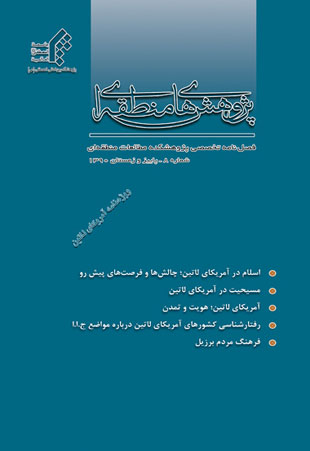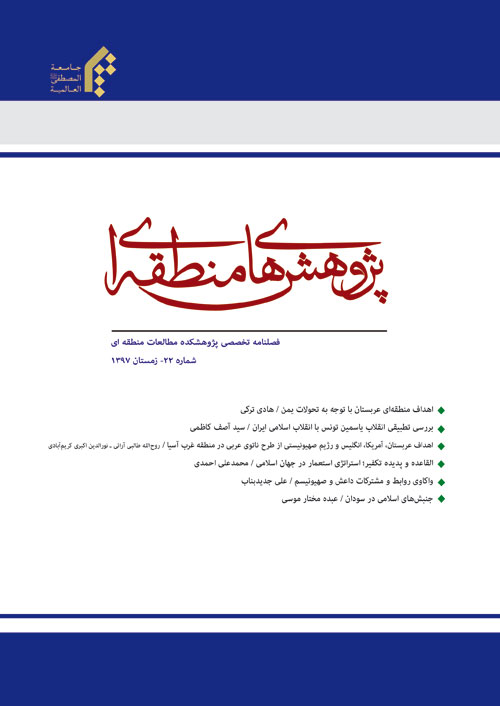فهرست مطالب

فصلنامه پژوهش های منطقه ای
شماره 8 (پاییز و زمستان 1390)
- تاریخ انتشار: 1391/05/15
- تعداد عناوین: 8
-
صفحه 19
-
صفحه 99
-
صفحه 163
-
صفحه 203
-
Page 19Latin America is the most populated Christian region in the world, with a Catholic majority. The Christian missionaries of Europe began their religious missions concurrent with the liberation of the new lands; Christianizing the citizens of the region by all possible means including subornation, intimidation, genocide and etc. Diverse Catholic factions particularly the Jesuits, Franciscans and the Dominicans played a very effective role in promoting Christianity in the region and by the liberation of the countries from the Spanish- Portuguese Imperialism the stage was set for the performance of the Protestants. From amongst the Protestant divisions, Anglican Protestantism (the Evangelicans), Pentecostalism, Mormonism and Jehovah’s witnesses have a more prominent movement and factions like the Methodists, the Baptists and the Hedonists are also seen present. This thesis intends to engage in a trend analysis of Christianity in Latin America and the gradual process of Christianization of the region followed by a brief look over the activities of each of the cited sects.Keywords: Christianity, Latin America, Catholic, Evangelicans, Liberation Theology, Mormonism, Pentecostalism
-
Page 57Upon the migration of the Spanish and the Portuguese to the Latin America and their full-scale sovereignty entwined with their coarse Imperialism over the region, this terrain was turned into a Christian territory to the point where after five centuries, currently over 85 percent of the population in the region are Christians while the followers of other religions and other native creeds in the region are of trivial numbers. The core Muslim population of the contemporary era are the off springs of the migrants who were initially brought by the European Colonists from West Africa or the Indian subcontinent as slaves or labours to Brazil, Central America, and the Caribbean islands. Another wave of migrations was concurrent with the reformations that took place in the Middle East in the first and mid-decades of the twenty first century when masses of Arab Muslims and Christians – particularly from Lebanon, Palestine and Syria – came to this region, whose presence caused the expansion of Islam in this region – especially in Brazil and Argentina. This paper will examine the position of Islam and Muslims in this region and will intend to provide coherent answers to several questions such as; what is the status of migrant Muslims and native Muslims in the region? What are the causes of tendency towards Islam? And what are the challenges faced by the Muslims? What are the opportunities they look forward to?Keywords: Latin America, Islam, Brazil, Argentina, Saudi Arabia, Turkey, Iran
-
Page 99An authoritarian dominion in many of the analyses related to different regions of the world has caused these analyses’ to turn into quotations of particular aspects of these regions, resulting in the negligence of other important aspects of the studied subject. The stance of the developed countries particularly United States and Europe towards Latin America is effected by economic, political and security considerations which awards a unique status to Latin America in international affairs. However, the focal point of this thesis is Latin America “to remain as Latin America”, the matter which sets it apart from other regions in the world. Preservation of Identity, culture and civilization doctrines – the symbols of which are evident in the political conduct of the politicians as it is in the cultural products – will prepare the grounds for the Latin America in the near future and in the era of globalization to occupy a distinctive status. In other words, by putting together certain factors and criteria such a conclusion can be obtained that; “the Latin American Dialogue” in the era of globalization would be the most prominent feature of this part of the world. On the other hand, the economic growth and the elevation of the status of Latin American countries, annunciates the appearance of a new civilization amid other existing civilizations, as once “Civilization identity” is bonded with power, this will cause the appearance of a civilization.Keywords: International order, Latin America, Identity, Civilization, America, Europe, Mercosur, NAFTA
-
Page 133Subsequent to the Islamic revolution, the Islamic Republic of Iran embraced a foreign policy which entailed a reform in the existing state of affairs in the world. Furthermore fundamental beliefs such as the “No East nor West policy” and “Support for the deprived in the world” became the core fundamentals for its foreign policies. These issues caused a continuous tension between the Islamic Republic and the international states; as a result in every periodic stage an issue prepared the grounds for this tension. Respectively, the Iranian foreign policy following the revolution towards the third world countries, has fortified the role of these countries in the Iranian foreign relations. Issues such as the Iranian nuclear rights, and the state of Human rights in Iran, are currently the key factors for cyber attacks launched by the Western countries against the Islamic Republic of Iran. This paper intends to examine the role of the Latin American countries in these files and to analyse their behaviour in this regard. The hypothesis of this study is that the behaviour of the Latin American countries is manipulated by the variable of United States. In other words, the more harmonious has been their foreign policy with the United States, the more unfriendly behaviour they have shown.Keywords: Islamic Republic of Iran, Nuclear case, Human rights documents, Latin America, America
-
Page 163Brazil is the largest and the most populated country in Latin America. The people of this country are mainly Catholics and their spoken language is Portuguese. The Amerindians, Black skins of African ancestry and the white skins of European ancestry are the three main races in this country. Later on migrants from East Asia and the Middle East (Arabs) also came to reside in this country. As a result multi-ethnicity and identity assortment is among the chief attributes of Brazil’s present society. This thesis which is an extract from the Encyclopaedia of world cultures, in a broad study of different topics and subjects examines the culture of the people of Brazil and presents an analysis of the issues such as racial and ethnic relations, national identity, family, rituals and practices, religious beliefs, ceremonies, celebrations, skills and etc.Keywords: Brazil, Culture, Ethnic relations, Identity, Portuguese ancestries, African Ancestries


